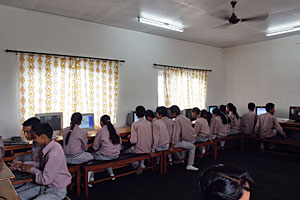 NEIL DIXIT RIGHT CLICK: Sabina Maharjan, a computer teacher at Adarsha Saula School, instructs a student during her class. |
Dina Tamang picks up her exercise book when the school bell rings to signal the end of class. But she is not rushing out to play, the ninth grader at a government school in Lalitpur heads to a brand new computer lab.
Dina sits at her own computer with the rest of the class and follows her teacher, Sabina Maharjan, intently with the intricacies of HTML coding.
Given the well-equipped digital lab, one would think that Dina goes to one of the city's fancy private schools. But she is a student at the government-run Adarsha Saula School in Sainbu, 10 km south of the capital.
Unlike most public schools, Adarsha Saula has a computer lab with 20 computers, thanks to an initiative of the Rotary Club of Patan which has so far donated over 300 computers to 27 government schools in Lalitpur District.
 |
The initiative has helped at least partially bridge Nepal's digital divide and the gap between private and public schools. "We realised that for children today it is no longer enough to be able to read and write, they should be computer literate," says Siba Bhakta Rajbhandari, who spearheads the club's computer donation program.
The Rotary Club of Patan was awarding scholarships to students when the schools said they needed help to set up computer labs. But, Rajbhandari said, the club first wanted to make sure the computers were properly used and maintained.
While the club grants the computers, the schools are required to build a suitable room with necessary furniture. The school is also responsible for employing a trained computer teacher.
The club raised money locally and collaborated with international Rotary clubs to buy the computers. At first, the club gave a few computers to each school, but the children just didn't get enough time on them.
 |
"We now focus on setting up digital labs with at least 10 computers and a trained teacher," explains Rajbhandari.
At Adarsha Saula, for instance, Grade 6-10 get computer instruction and most students have at least two classes every week.
"I wish we had more time on the computers," says Dina as she handles the mouse to find a program icon on the monitor.
Sabina Maharjan says the students are eager to learn more than what is prescribed in the curriculum. Recently, the school acquired an internet connection, allowing students to learn not just word processing but also to navigate the internet.
Rotary's initiative in Lalitpur has to be replicated all over the country for the digital gap to be really bridged. Despite efforts such as the One Laptop per Child project, public schools in Nepal still remain technologically deprived.
 |
"We run computer classes only for Grades 7 and 8. The students are too poor to pay a fee, how can we afford to maintain the systems and train teachers?" complains Mina Shrestha, the principal of Balkumari School.
The government pays teachers' salaries and gives minimum allowance for operational expenses, but does not provide additional support. Some schools charge the students a minimal fee for computer usage. Others have been collecting funds by letting the community use the computer after school hours.
But luckily for the students at Adarsha Saula, this problem does not exist. "Education today must include information technology," acknowledges Bhim Sapkota, the principal. He is proud that his students will be computer literate and have better opportunities when they leave school.
When asked if the computer classes are helping them, tenth grader Rajendra Rai nods his head vigorously: "I now know I want to be a computer engineer when I grow up, and that is only because the school set up this lab."
Lucky laptops
Chaudhary Group is following up on its Gyan Uday Scholarship campaign, with a new scheme to give away notebooks to school students nationwide. Coupons for the computers will be found in packets of Wai Wai instant noodles, lucky winners will get small laptops designed for educational purposes. Under the Wai Wai Gyan Uday Micro-Laptop Yojana an adult who wins a coupon has to nominate a school student to get it.
READ ALSO:
Dailekh bridges the digital divide, SHRISTEE GURUNG
Instead of one laptop per child PAT HALL


